- Home
- Robert Ervin Howard
Black Colossus
Black Colossus Read online
Black Colossus
Robert Ervin Howard
Black Colossus
by Robert Ervin Howard
Chapter I
"The Night of Power, when Fate stalked through the corridors of the world like a colossus just risen from an age-old throne of granite—"
E. Hoffman Price: The Girl From Samarkand
Only the age-old silence brooded over the mysterious ruins of Kuthchemes, but Fear was there; Fear quivered in the mind of Shevatas, the thief, driving his breath quick and sharp against his clenched teeth.
He stood, the one atom of life amidst the colossal monuments of desolation and decay. Not even a vulture hung like a black dot in the vast blue vault of the sky that the sun glazed with its heat. On every hand rose the grim relics of another, forgotten age: huge broken pillars, thrusting up their jagged pinnacles into the sky; long wavering lines of crumbling walls; fallen cyclopean blocks of stone; shattered images, whose horrific features the corroding winds and dust-storms had half erased. From horizon to horizon no sign of life: only the sheer breathtaking sweep of the naked desert, bisected by the wandering line of a long-dry river course; in the midst of that vastness the glimmering fangs of the ruins, the columns standing up like broken masts of sunken ships — all dominated by the towering ivory dome before which Shevatas stood trembling.
The base of this dome was a gigantic pedestal of marble rising from what had once been a terraced eminence on the banks of the ancient river. Broad steps led up to a great bronze door in the dome, which rested on its base like the half of some titanic egg. The dome itself was of pure ivory, which shone as if unknown hands kept it polished. Likewise shone the spired gold cap of the pinnacle, and the inscription which sprawled about the curve of the dome in golden hieroglyphics yards long. No man on earth could read those characters, but Shevatas shuddered at the dim conjectures they raised. For he came of a very old race, whose myths ran back to shapes undreamed of by contemporary tribes.
Shevatas was wiry and lithe, as became a master-thief of Zamora . His small round head was shaven, his only garment a loin-cloth of scarlet silk. Like all his race, he was very dark, his narrow vulture-like face set off by his keen black eyes. His long, slender and tapering fingers were quick and nervous as the wings of a moth. From a gold-scaled girdle hung a short, narrow, jewel-hilted sword in a sheath of ornamented leather. Shevatas handled the weapon with apparently exaggerated care. He even seemed to flinch away from the contact of the sheath with his naked thigh. Nor was his care without reason.
This was Shevatas, a thief among thieves, whose name was spoken with awe in the dives of the Maul and the dim shadowy recesses beneath the temples of Bel, and who lived in songs and myths for a thousand years. Yet fear ate at the heart of Shevatas as he stood before the ivory dome of Kuthchemes. Any fool could see there was something unnatural about the structure; the winds and suns of three thousand years had lashed it, yet its gold and ivory rose bright and glistening as the day it was reared by nameless hands on the bank of the nameless river.
This unnaturalness was in keeping with the general aura of these devil-haunted ruins. This desert was the mysterious expanse lying southeast of the lands of Shem. A few days' ride on camel-back to the southwest, as Shevatas knew, would bring the traveller within sight of the great river Styx at the point where it turned at right angles with its former course, and flowed westward to empty at last into the distant sea. At the point of its bend began the land of Stygia, the dark-bosomed mistress of the south, whose domains, watered by the great river, rose sheer out of the surrounding desert.
Eastward, Shevatas knew, the desert shaded into steppes stretching to the Hyrkanian kingdom of Turan , rising in barbaric splendor on the shores of the great inland sea. A week's ride northward the desert ran into a tangle of barren hills, beyond which lay the fertile uplands of Koth, the southernmost realm of the Hyborian races. Westward the desert merged into the meadowlands of Shem, which stretched away to the ocean.
All this Shevatas knew without being particularly conscious of the knowledge, as a man knows the streets of his town. He was a far traveller and had looted the treasures of many kingdoms. But now he hesitated and shuddered before the highest adventure and the mightiest treasure of all.
In that ivory dome lay the bones of Thugra Khotan, the dark sorcerer who had reigned in Kuthchemes three thousand years ago, when the kingdoms of Stygia stretched far northward of the great river, over the meadows of Shem, and into the uplands. Then the great drift of the Hyborians swept southward from the cradle-land of their race near the northern pole. It was a titanic drift, extending over centuries and ages. But in the reign of Thugra Khotan, the last magician of Kuthchemes, gray-eyed, tawny-haired barbarians in wolfskins and scale-mail had ridden from the north into the rich uplands to carve out the kingdom of Koth with their iron swords. They had stormed over Kuthchemes like a tidal wave, washing the marble towers in blood, and the northern Stygian kingdom had gone down in fire and ruin.
But while they were shattering the streets of his city and cutting down his archers like ripe corn, Thugra Khotan had swallowed a strange terrible poison, and his masked priests had locked him into the tomb he himself had prepared. His devotees died about that tomb in a crimson holocaust, but the barbarians could not burst the door, nor ever mar the structure by maul or fire. So they rode away, leaving the great city in ruins, and in his ivory-domed sepulcher great Thugra Khotan slept unmolested, while the lizards of desolation gnawed at the crumbling pillars, and the very river that watered his land in old times sank into the sands and ran dry.
Many a thief sought to gain the treasure which fables said lay heaped about the moldering bones inside the dome. And many a thief died at the door of the tomb, and many another was harried by monstrous dreams to die at last with the froth of madness on his lips.
So Shevatas shuddered as he faced the tomb, nor was his shudder altogether occasioned by the legend of the serpent said to guard the sorcerer's bones. Over all myths of Thugra Khotan hung horror and death like a pall. From where the thief stood he could see the ruins of the great hall wherein chained captives had knelt by the hundreds during festivals to have their heads hacked off by the priest-king in honor of Set, the Serpent-god of Stygia. Somewhere near by had been the pit, dark and awful, wherein screaming victims were fed to a nameless amorphic monstrosity which came up out of a deeper, more hellish cavern. Legend made Thugra Khotan more than human; his worship yet lingered in a mongrel degraded cult, whose votaries stamped his likeness on coins to pay the way of their dead over the great river of darkness of which the Styx was but the material shadow. Shevatas had seen this likeness, on coins stolen from under the tongues of the dead, and its image was etched indelibly in his brain.
But he put aside his fears and mounted to the bronze door, whose smooth surface offered no bolt or catch. Not for naught had he gained access into darksome cults, had harkened to the grisly whispers of the votaries of Skelos under midnight trees, and read the forbidden iron-bound books of Vathelos the Blind.
Kneeling before the portal, he searched the sill with nimble fingers; their sensitive tips found projections too small for the eye to detect, or for less-skilled fingers to discover. These he pressed carefully and according to a peculiar system, muttering a long-forgotten incantation as he did so. As he pressed the last projection, he sprang up with frantic haste and struck the exact center of the door a quick sharp blow with his open hand.
There was no rasp of spring or hinge, but the door retreated inward, and the breath hissed explosively from Shevatas's clenched teeth. A short narrow corridor was disclosed. Down this the door had slid, and was now in place at the other end. The floor, ceiling and sides of the tunnel-like aperture were of ivory, and now from
an opening on one side came a silent writhing horror that reared up and glared on the intruder with awful luminous eyes; a serpent twenty feet long, with shimmering, iridescent scales.
The thief did not waste time in conjecturing what night-black pits lying below the dome had given sustenance to the monster. Gingerly he drew the sword, and from it dripped a greenish liquid exactly like that which slavered from the scimitar-fangs of the reptile. The blade was steeped in the poison of the snake's own kind, and the obtaining of that venom from the fiend-haunted swamps of Zingara would have made a saga in itself.
Shevatas advanced warily on the balls of his feet, knees bent slightly, ready to spring either way like a flash of light. And he needed all his co-ordinate speed when the snake arched its neck and struck, shooting out its full length like a stroke of lightning. For all his quickness of nerve and eye, Shevatas had died then but for chance. His well-laid plans of leaping aside and striking down on the outstretched neck were put at naught by the blinding speed of the reptile's attack. The thief had but time to extend the sword in front of him, involuntarily closing his eyes and crying out. Then the sword was wrenched from his hand and the corridor was filled with a horrible thrashing and lashing.
Opening his eyes, amazed to find himself still alive, Shevatas saw the monster heaving and twisting its slimy form in fantastic contortions, the sword transfixing its giant jaws. Sheer chance had hurled it full against the point he had held out blindly. A few moments later the serpent sank into shining, scarcely quivering coils, as the poison on the blade struck home.
Gingerly stepping over it, the thief thrust against the door, which this time slid aside, revealing the interior of the dome. Shevatas cried out; instead of utter darkness he had come into a crimson light that throbbed and pulsed almost beyond the endurance of mortal eyes. It came from a gigantic red jewel high up in the vaulted arch of the dome. Shevatas gaped, inured though he was to the sight of riches. The treasure was there, heaped in staggering profusion — piles of diamonds, sapphires, rubies, turquoises, opals, emeralds; ziggurats of jade, jet and lapis lazuli; pyramids of gold wedges; teocallis of silver ingots; jewel-hilted swords in cloth-of-gold sheaths; golden helmets with colored horsehair crests, or black and scarlet plumes; silver scaled corselets; gem-crusted harness worn by warrior-kings three thousand years in their tombs; goblets carven of single jewels; skulls plated with gold, with moonstones for eyes; necklaces of human teeth set with jewels. The ivory floor was covered inches deep with gold dust that sparkled and shimmered under the crimson glow with a million scintillant lights. The thief stood in a wonderland of magic and splendor, treading stars under his sandalled feet.
But his eyes were focussed on the dais of crystal which rose in the midst of the shimmering array, directly under the red jewel, and on which should be lying the moldering bones, turning to dust with the crawling of the centuries. And as Shevatas looked, the blood drained from his dark features; his marrow turned to ice, and the skin of his back crawled and wrinkled with horror, while his lips worked soundlessly. But suddenly he found his voice in one awful scream that rang hideously under the arching dome. Then again the silence of the ages lay among the ruins of mysterious Kuthchemes.
Chapter II
Rumors drifted up through the meadowlands, into the cities of the Hyborians. The word ran along the caravans, the long camel-trains plodding through the sands, herded by lean, hawkeyed men in white kaftans. It was passed on by the hook-nosed herdsmen of the grasslands, from the dwellers in tents to the dwellers in the squat stone cities where kings with curled blueblack beards worshipped round-bellied gods with curious rites. The word passed up through the fringe of hills where gaunt tribesmen took toll of the caravans. The rumors came into the fertile uplands where stately cities rose above blue lakes and rivers: the rumors marched along the broad white roads thronged with ox-wains, with lowing herds, with rich merchants, knights in steel, archers and priests.
They were rumors from the desert that lies east of Stygia, far south of the Kothian hills. A new prophet had risen among the nomads. Men spoke of tribal war, of a gathering of vultures in the southeast, and a terrible leader who led his swiftly increasing hordes to victory. The Stygians, ever a menace to the northern nations, were apparently not connected with this movement; for they were massing armies on their eastern borders and their priests were making magic to fight that of the desert sorcerer, whom men called Natohk, the Veiled One; for his features were always masked.
But the tide swept northwestward, and the blue-bearded kings died before the altars of their pot-bellied gods, and their squat-walled cities were drenched in blood. Men said that the uplands of the Hyborians were the goal of Natohk and his chanting votaries.
Raids from the desert were not uncommon, but this latest movement seemed to promise more than a raid. Rumor said Natohk had welded thirty nomadic tribes and fifteen cities into his following, and that a rebellious Stygian prince had joined him. This latter lent the affair an aspect of real war.
Characteristically, most of the Hyborian nations were prone to ignore the growing menace. But in Khoraja, carved out of Shemite lands by the swords of Kothic adventurers, heed was given. Lying southeast of Koth, it would bear the brunt of the invasion. And its young king was captive to the treacherous king of Ophir, who hesitated between restoring him for a huge ransom, or handing him over to his enemy, the penurious king of Koth, who offered no gold, but an advantageous treaty. Meanwhile, the rule of the struggling kingdom was in the white hands of young princess Yasmela, the king's sister.
Minstrels sang her beauty throughout the western world, and the pride of a kingly dynasty was hers. But on that night her pride was dropped from her like a cloak. In her chamber whose ceiling was a lapis lazuli dome, whose marble floor was littered with rare furs, and whose walls were lavish with golden friezework, ten girls, daughters of nobles, their slender limbs weighted with gem-crusted armlets and anklets, slumbered on velvet couches about the royal bed with its golden dais and silken canopy. But princess Yasmela lolled not on that silken bed. She lay naked on her supple belly upon the bare marble like the most abased suppliant, her dark hair streaming over her white shoulders, her slender fingers intertwined. She lay and writhed in pure horror that froze the blood in her lithe limbs and dilated her beautiful eyes, that pricked the roots of her dark hair and made goose-flesh rise along her supple spine.
Above her, in the darkest corner of the marble chamber, lurked a vast shapeless shadow. It was no living thing of form or flesh and blood. It was a clot of darkness, a blur in the sight, a monstrous night-born incubus that might have been deemed a figment of a sleep-drugged brain, but for the points of blazing yellow fire that glimmered like two eyes from the blackness.
Moreover, a voice issued from it — a low subtle inhuman sibilance that was more like the soft abominable hissing of a serpent than anything else, and that apparently could not emanate from anything with human lips. Its sound as well as its import filled Yasmela with a shuddering horror so intolerable that she writhed and twisted her slender body as if beneath a lash, as though to rid her mind of its insinuating vileness by physical contortion.
"You are marked for mine, princess," came the gloating whisper. "Before I wakened from the long sleep I had marked you, and yearned for you, but I was held fast by the ancient spell by which I escaped mine enemies. I am the soul of Natohk, the Veiled One! Look well upon me, princess! Soon you shall behold me in my bodily guise, and shall love me!"
The ghostly hissing dwindled off in lustful titterings, and Yasmela moaned and beat the marble tiles with her small fists in her ecstasy of terror.
"I sleep in the palace chamber of Akbatana," the sibilances continued. "There my body lies in its frame of bones and flesh. But it is but an empty shell from which the spirit has flown for a brief space. Could you gaze from that palace casement you would realize the futility of resistance. The desert is a rose garden beneath the moon, where blossom the fires of a hundred thousand warriors. As an avalanche
sweeps onward, gathering bulk and momentum, I will sweep into the lands of mine ancient enemies. Their kings shall furnish me skulls for goblets, their women and children shall be slaves of my slaves' slaves. I have grown strong in the long years of dreaming . . .
"But thou shalt be my queen, oh princess! I will teach thee the ancient forgotten ways of pleasure. We—" Before the stream of cosmic obscenity which poured from the shadowy colossus, Yasmela cringed and writhed as if from a whip that flayed her dainty bare flesh.
"Remember!" whispered the horror. "The days will not be many before I come to claim mine own!"
Yasmela, pressing her face against the tiles and stopping her pink ears with her dainty fingers, yet seemed to hear a strange sweeping noise, like the beat of bat wings. Then, looking fearfully up, she saw only the moon that shone through the window with a beam that rested like a silver sword across the spot where the phantom had lurked. Trembling in every limb, she rose and staggered to a satin couch, where she threw herself down, weeping hysterically. The girls slept on, but one, who roused, yawned, stretched her slender figure and blinked about. Instantly she was on her knees beside the couch, her arms about Yasmela's supple waist.
"Was it — was it—?" Her dark eyes were wide with fright. Yasmela caught her in a convulsive grasp.
"Oh, Vateesa. It came again! I saw It — heard It speak! It spoke Its name — Natohk! It is Natohk! It is not a nightmare — it towered over me while the girls slept like drugged ones. What oh, what shall I do?"
Vateesa twisted a golden bracelet about her rounded arm in meditation.
"Oh, princess," she said, "it is evident that no mortal power can deal with It, and the charm is useless that the priests of Ishtar gave you. Therefore seek you the forgotten oracle of Mitra."
In spite of her recent fright, Yasmela shuddered. The gods of yesterday become the devils of tomorrow. The Kothians had long since abandoned the worship of Mitra, forgetting the attributes of the universal Hyborian god. Yasmela had a vague idea that, being very ancient, it followed that the deity was very terrible. Ishtar was much to be feared, and all the gods of Koth. Kothian culture and religion had suffered from a subtle admix ture of Shemite and Stygian strains. The simple ways of the Hyborians had become modified to a large extent by the sensual, luxurious, yet despotic habits of the East.

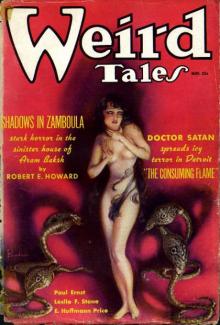 Shadows in Zamboula (conan the barbarian)
Shadows in Zamboula (conan the barbarian) Shadows in the Moonlight (conan the barbarian)
Shadows in the Moonlight (conan the barbarian)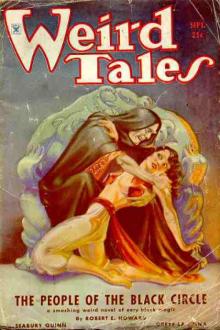 The People of the Black Circle (conan the barbarian)
The People of the Black Circle (conan the barbarian) Almuric
Almuric Xuthal of the Dusk (conan the barbarian)
Xuthal of the Dusk (conan the barbarian)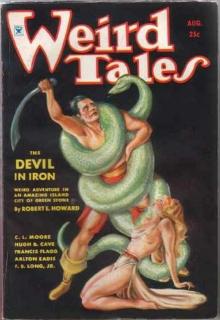 The Devil in Iron (conan the barbarian)
The Devil in Iron (conan the barbarian) Beyond the Black River (conan the warrior)
Beyond the Black River (conan the warrior) The Phoenix on the Sword (conan the barbarian)
The Phoenix on the Sword (conan the barbarian)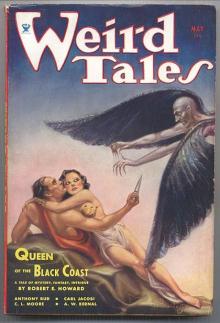 Queen of the Black Coast
Queen of the Black Coast The Tower of the Elephant (conan the barbarian)
The Tower of the Elephant (conan the barbarian) Black Colossus
Black Colossus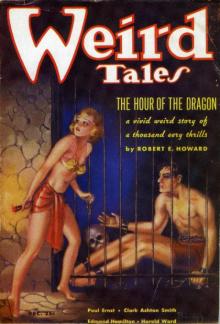 The Hour of the Dragon (conan the barbarian)
The Hour of the Dragon (conan the barbarian)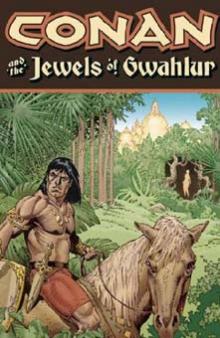 Jewels of Gwahlur (conan the warrior)
Jewels of Gwahlur (conan the warrior) Gods of the North (conan the barbarian)
Gods of the North (conan the barbarian) The Pool of the Black One (conan the barbarian)
The Pool of the Black One (conan the barbarian) A Witch Shall Be Born
A Witch Shall Be Born Red Nails (conan the warrior)
Red Nails (conan the warrior)